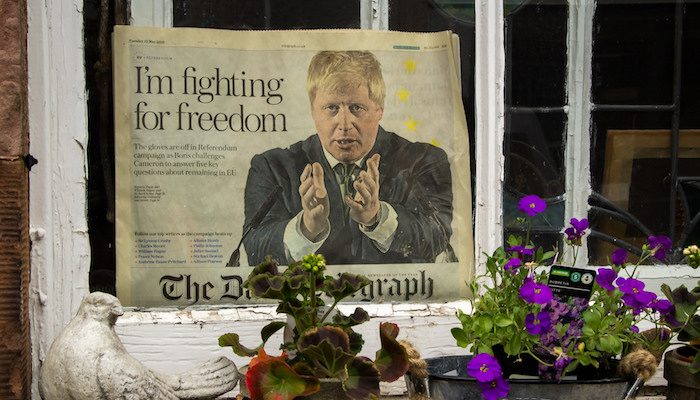
At the start of the European Union referendum campaign I ran a class going through the changes David Cameron had negotiated and which are to be put to the UK voters on June 23rd. It was a very dull lecture and eyes soon glazed over. At the end I told them to forget everything I’d said because it was all irrelevant – the referendum was actually about immigration.
The right-wing press made that clear from the start with relentless headlines about the floods of migrants and refugees heading for the UK who could only be headed off by Brexit. Then the Leave campaign headlined the immigration question on May 29th, when Boris Johnson and Michael Gove attacked Cameron’s net migration target of 100,000 a year, and challenged him to come clean that it cannot be met while the UK remains a member of the European Union. Since then there has been a significant shift in momentum towards the Leave campaign, with some polls putting them in a clear lead with just days to go to the vote.
Cameron now seems an irrelevance for two reasons. First, he has no answer the the Johnson/Gove challenge – he had the chance to abandon the net migration target at the last election but for some reason stuck with it. Second, the evidence is that ‘traditional’ Labour voters are the key to the referendum result, with many of them convinced by the Leave campaign’s arguments about immigration. This has led some key Labour figures to stage a late intervention, with deputy leader Tom Watson saying EU freedom of movement rules for workers will have to be revised, and former chancellor Ed Balls arguing that the EU needs to restore proper borders and controls over economic migration.
Their move is reflected by Guardian columnist Jonathan Freedland who urged the Remain campaign to change tack this week. Even though he personally believes people have nothing to fear from immigration and much to gain, a significant number of Labour voters believe the opposite, and, he argues, the Remain campaign must win them over, not by pointing out that their concerns are misplaced, but by persuading them that they can be met within the EU.
He compares such a move with the moment in the Scottish independence campaign when the pro-union parties promised that all the concerns people had could be met fully while remaining part of the UK. The problem with Freedland’s proposal is, as he recognises, that the only people who can make that pledge with any authority are the key EU member states themselves, and they are not going to do it.
Another option for the Labour party is the Yvette Cooper line which is to try to persuade people that the referendum is not about immigration, but the problem is that if people want the referendum to be about immigration then it is about immigration. And so the final option is Jeremy Corbyn’s tactic, to defend the positive benefits of immigration and the principle of freedom of movement. This is, in the end, the only rational and principled position to take, but we know that we are arguing against an unprincipled Leave campaign and that our arguments will fall into the rationality gap.
Polly Toynbee identifies that gap this week. Joining volunteers on the ‘Labour in’ phone campaign, she observes: “Try arguing with facts and you get nowhere”. Immigrants are to blame. For what? For anything that is going wrong with our community. Tell people the real reasons why there is a shortage of jobs, why people are trapped in low-paid work, why there is a housing shortage, why the NHS is in crisis, and they will not believe you – the cause for all these ills is immigration, and one thing we know about immigration is that it makes people angry.
Earlier this month Aditya Chakrabortty reported from Newport in Wales, part of the Labour heartland, where he found “a burning anger that spits in all directions”. He identified a resentment that ‘hard-working people’ were financing the lives of the ‘lazy’ – immigrants here for two minutes were claiming benefits, houses, jobs and treatment on the NHS, despite nobody having ever met any such an immigrant.
There is much at stake on June 23rd, and we might think that in the face of all this Freedland and others are right that we should abandon reason and principle, accept people’s fear and anger, and appease them through making promises to roll back freedom of movement and curb immigration despite the fact that they have nothing to do with creating the conditions that make people scared and angry in the first place.
But Toynbee warns of great danger of playing to this anger, that we may end up with national socialism under a different name. If we do leave the EU and nothing changes –if jobs, homes and health care remain in short supply – where does the anger go next? If EU immigrants turn out not to be the culprits, then it must be other immigrants who have been here longer, or anyone who can be identified as in some sense ‘alien’. Immigration politics is never a great distance from ‘race’ politics, and that distance will be closed in a moment.
We need to hang on to reason and principle, to defend them however unpopular they may be, because whatever happens after June 23rd we will need them more than ever, and to have abandoned them in order to make fear and anger the driving forces of politics would be a dreadful legacy. Having abandoned them we will not be able to reclaim them, and we will end up back in a place which we thought Europe had left behind forever.